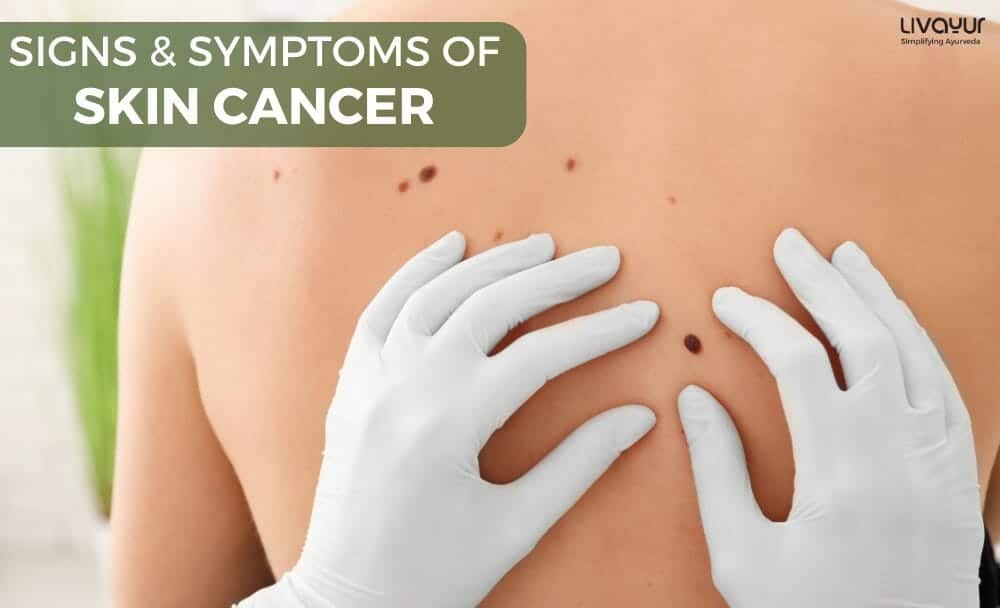This article is reviewed by Dr. Harimohan Chandola

Skin cancer is a condition characterised by the abnormal growth of cells in the skin tissues. If left undetected, it can even spread to nearby tissues or other parts of the body, leading to severe health problems (1).
If you or your loved ones have been diagnosed with skin cancer, then you have come to the right place. Here is everything you need to know about skin cancer and its treatment in both modern and Ayurvedic medicine.
Skin Cancer Types (1)
There are three primary types of skin cancer:
- Basal cell carcinoma, which originates in the basal cells located in the lower part of the epidermis, Squamous cell carcinoma, which develops in the squamous cells of the outer layer of the skin, and Melanoma, which forms in melanocytes that produce melanin, a protective pigment responsible for skin colour.
Melanoma is the most severe type of skin cancer, as it can metastasize to other parts of the body. Some more types of skin cancer include:
- Kaposi sarcoma
- Merkel cell carcinoma
- Sebaceous gland carcinoma
- Dermatofibrosarcoma protuberans
Skin Cancer Symptoms (1)
Some common signs and symptoms of skin cancer include:
- New moles or moles that undergo changes in size, shape, colour or begin to bleed
- Pearly or waxy bumps that develop on your face, ears, or neck
- Flat patches or bumps that exhibit a pink/red, or brown colour
- Scar-like areas on the skin
- Crusty sores with a depression in the centre or frequent bleeding
- Wounds or sores that refuse to heal or reappear after healing
- Rough, scaly lesions that may itch, bleed, or form crusts
Skin Cancer Causes (1)
The primary cause of skin cancer is excessive exposure to sunlight, particularly when sunburn and blistering occur.
Sunlight’s UV rays harm the DNA in the skin, leading to the development of abnormal cells. These cells proliferate rapidly and in an unorganised manner, resulting in the formation of a cancerous mass.
Skin Cancer Stages (1)
Determining the stage of skin cancer is important to understand the extent of cancer in the body. The stages range from 0 to IV, indicating the level of cancer spread and treatment difficulty. However, the staging differs between melanoma and non-melanoma skin cancers originating from basal or squamous cells.
Melanoma Staging
Stage 0 (melanoma in situ): Cancer is confined to the top layer of the skin.
Stage I: Low-risk melanoma with no evidence of spread, often curable through surgery.
Stage II: Some features suggest a likelihood of recurrence but no evidence of spread.
Stage III: Melanoma has spread to nearby lymph nodes or nearby skin.
Stage IV: Melanoma has spread to distant lymph nodes, skin, or internal organs.
Non-Melanoma Staging
Stage 0: Cancer is limited to the top layer of the skin.
Stage I: Cancer affects the top and middle layers of the skin.
Stage II: Cancer spreads to nerves or deeper layers of the skin.
Stage III: Cancer has spread to lymph nodes beyond the skin.
Stage IV: Cancer has metastasized to other organs such as the liver, lungs, or brain.

Skin Cancer Diagnosis (1)
The diagnosis of skin cancer involves several steps. Initially, a dermatologist will inquire about any changes in existing moles, freckles, or other skin spots, as well as the presence of new skin growths. They will then conduct a thorough examination of the entire body, including areas such as the scalp, ears, palms, and soles of the feet, between the toes, around the genitals, and between the buttocks.
If skin cancer is suspected, a biopsy may be performed. This involves the removal of a tissue sample, which is then sent to a laboratory for microscopic examination by a pathologist.
Based on the results, the dermatologist will determine if the lesion is indeed skin cancer, identify the specific type, and discuss appropriate treatment options.
Skin Cancer Treatment (1)
Modern treatments for skin cancer vary depending on the stage of the cancer. For small, surface-level cancers, a biopsy alone may be sufficient to remove all cancerous tissue. However, other treatment options are available and can be used alone or in combination, such as:
- Cryotherapy: It involves using liquid nitrogen to freeze skin cancer, causing the dead cells to slough off.
- Excisional Surgery: It is a procedure where the tumour and some surrounding healthy skin are removed to ensure complete eradication of cancer.
- Mohs Surgery: It is a specialised technique that selectively removes diseased tissue while preserving as much normal tissue as possible.
- Curettage and Electrodesiccation: This technique involves scraping the tumour with a sharp instrument and using an electric needle to destroy any remaining cancer cells.
- Chemotherapy: It involves using medications to kill cancer cells and can be administered topically, orally, or through intravenous methods, depending on the extent of the cancer.
- Immunotherapy: It involves medications that train the immune system to target and kill cancer cells.
- Radiation Therapy: It employs high-energy beams to destroy or inhibit the growth of cancer cells.
- Photodynamic Therapy: It entails applying medication to the skin and activating it with light, specifically targeting and destroying precancerous cells.
It is important to note that each treatment method may have its own side effects and complications. Therefore, it is important to discuss all the options in detail with your healthcare provider.
Ayurvedic Herbs for Preventing Melanoma (2)
In addition to the modern treatment of skin cancer, you can also use the help of Ayurvedic herbs to prevent and aid in the treatment of melanoma. However, you should always consult an Ayurvedic practitioner before using any herb for cancer.
Neem
Neem is rich in nimbolide and azadirachtin compounds that are known for their antitumor and antioxidant activity. In addition, neem also protects the skin from UV rays and other contaminants while minimising wrinkles and fine lines.
Tulsi
Tulsi, also known as Holy basil, is known to contain nutrients and chemicals that have derma-toxic effects and can protect the skin from infections. Furthermore, it is rich in antioxidant properties that further help in preventing melanoma.
Amalaki
Amalaki, or Indian gooseberry, is rich in phenolics, flavonoids, vitamins, and minerals and offers potent antioxidant effects. It is known to protect the skin from UV-induced erythema and reduce free radicals.
Chandan
Chandan or sandalwood contains alpha-Santalol, an active constituent that exhibits anticancer and anti-inflammatory properties.
Ashwagandha
Ashwagandha possesses immunomodulatory, anti-inflammatory, and antioxidant properties. It also contains withaferin A and withanolide D that exhibit potent anticancer effects against various cancers.
The Takeaway
Skin cancer is a serious health condition that requires timely diagnosis and treatment. Understanding the types, stages, symptoms, causes, and treatment options is therefore crucial for effective management and prevention of complications.
Disclaimer: The information provided here is for general information and not meant to substitute any medical advice. Please consult your doctor for appropriate medical consultation.
FAQs (1)
Is skin cancer deadly?
Skin cancer is not always deadly, but it can grow and spread beyond the initial area if not caught early and can make the condition life-threatening.
Are most moles cancerous?
No, most moles are not cancerous. They are typically harmless and can be present at birth or develop until around the age of 40. The average adult has between 10 and 40 moles.
Can a mole become melanoma?
In rare cases, a mole can turn into melanoma, a type of skin cancer. Having more than 50 moles increases the chance of developing melanoma.
















